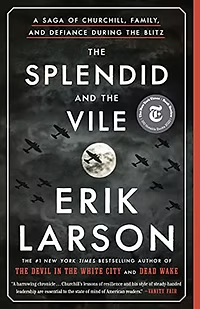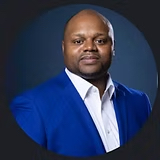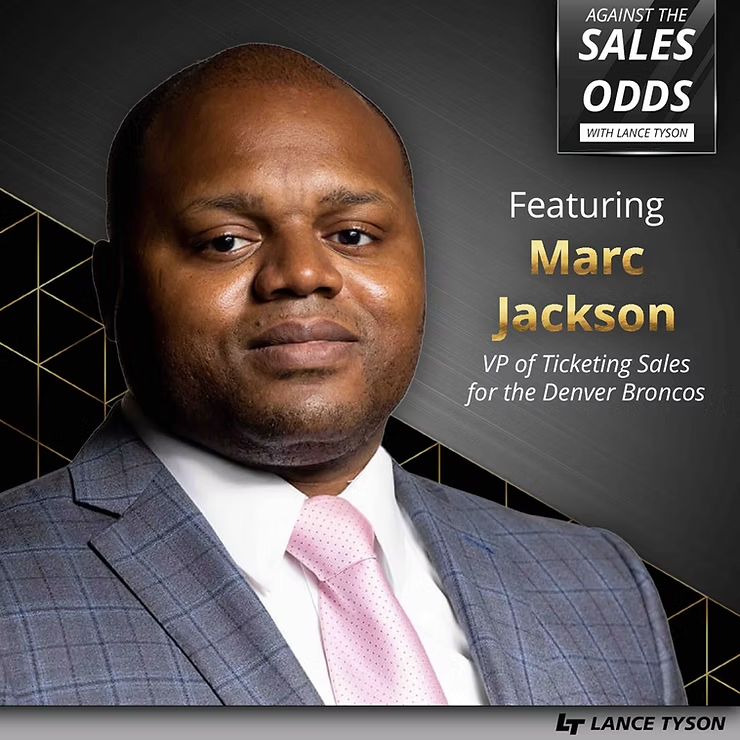Success is tasteless without the sweetness and bitterness of the journey. The obstacle could be the way to your success. In this episode, Lance Tyson sits down with the Vice President of Ticketing, Sales and Service for the Denver Broncos, Marc Jackson, to take us across his journey as a collegiate athlete who played football at The University of Illinois. Marc talks about the work ethic and lessons he learned on the field and how they translate to the business side of professional sports in his current and past roles. Through his experience, he indulges us with great advice and his definition of success while bringing many lessons that have been passed down from family and mentors to help him succeed in his career. Marc brings so much value to this conversation, so let’s hit that play button and be inspired to move forward beyond the obstacles.
—
Listen to the podcast here
The Obstacle Is The Way: Lessons On Success With Marc Jackson
I’m excited about this episode of the show because our guest is a personification of Against The Sales Odds with the way he approaches his business. I got Marc Jackson on. He’s the Vice President of Ticket Sales in service for the Denver Broncos. He is a dear friend of mine. I spent days before COVID and all of COVID with him. He was my guy. He was the last meeting before COVID. We started it. We were at that little tiny table in New York together, and we were making fun of COVID that we didn’t even think it was real. Within 24 hours, they shut the NBA down. That was how it went down with us.
It was a quick 180. We hear the reports one thing or another and it was like, “This is real.”
It was 24 hours. It was your last vendor meeting. I landed in Columbus from New York City, and they shut the NBA down. You were at Madison Square Garden at the time. It was the Big East Tournament. They started shutting games down that day. I will always remember Marc from that, and then we spent a lot of time together in COVID virtually.
In fact, there’s a lot bad that came out of COVID, but for us professionally at the Garden, with our sales skills, we developed that at an accelerated rate in large part due to the partnership with the Tyson Group. It felt like I was back at school in camp. It was 2 a day or 3 a day. We were repping. It was groups. It was inside. It was seasons. It was fun.
It was so hard during that time.
We did not let that time go to waste. We leaned into training and development, and made sure we came out stronger.
We switched everything over to virtual learning. That was the whole thing. We were testing what we were going to do and making these 180s. Marc was at Madison Square Garden at the time and the VP there. We converted everything over and went hard. We mastered the 60 to 90-minute session and got out of there. Anything more than that, everybody’s head was going to explode. That was in COVID. Since then, you’ve taken a bigger role with the NFL and the Denver Broncos. Tell everybody about your job and who reports up to you, and go from there.
If there’s a seat with a number on it, that’s me. I do ticketing sales and service for the Denver Broncos. That’s suites. That’s season tickets. That’s all ticketing opportunities. That’s service. That’s operations. That’s suite services, customer service, and club services from the field all the way to our 500-level and everything in between.
What does that total revenue look like for your team?
It’s high, without getting too technical. It’s not as high as I would like it to be. It’s certainly not as high as it was at the Garden because that was multi-property whereas this is just one. We’ve got our eye on the number one spot here in Denver, and we are going to chase it.
There you go. I love it. Tell about the group that reports to you. What does that look like? How many people are in that org chart up underneath you?
There are three directors. There’s a senior director of premium sales and service, a director of customer service, and then a senior director of ticket operations. Underneath them, there are a number of managers as well like club service managers. We’ve got some managers in ticketing operations as well. From there, it’s the most important people, which are the individual contributors and the people that make this thing work.
We have 5 club service reps, 3 premium service reps, and 10 reserve customer service reps. In our operations team, we have a total of 6 people. That includes the senior director and some of the managers as well. Those are the most important people within my group. I’m the least important. They’re the most important. They’re the ones that make things happen. It is roughly about 33 to 35 people.
From a business standpoint, we’re going to do a deeper dive. By the time you were brought into the Broncos and picked a couple of things, sales weren’t where they needed to be.
It was the middle of COVID. The folks that brought me in, their grand design was to elevate not only our strategies and processes but also the customer experience. Something that made me a good fit for this organization at the time is as you’re well aware of the work that we did together in New York, as well as Charlotte, the thing that I focus on is training, development, strategy, process, and maximizing every opportunity in between all of those buzzwords while also elevating the fan culture.
That’s your culture and your superpower. I want to get into that. If one theme came out of this with Marc, it is his ability to build a culture of coaching, learning, and training. Not every organization has that. Some people check that off the list or they do it when they need to. That’s built into the mentality of any team I’ve ever worked with you on. At this point, you and I are going on 15 to 20 years that we worked together with three different organizations. Charlotte was Bobcat at the time.
Bobcats, Hornets, and then Madison Square Garden.
Let’s go backward. Everybody that tunes in to this is like, “How does Marc get here? What does that journey look like?” Tell a little bit of background coming out of school, what you did in school, and maybe that first job.
I was a student-athlete. I went to school at the University of Illinois. I was a student-athlete there. I was a football player there during the Ron Turner era. I was fortunate that my brother was on the squad with me. My father was on the staff, as well on the opposite side of the ball. Coming out of school, I was less prepared because I had most of my eggs in one basket that ultimately didn’t pan out.
Was the goal to play football?
Correct, but that doesn’t always happen. When it came time for me to put my cleats on a wire like Marshon, I had to figure some things out. Luckily, for whatever reason, I’ve been able to build relationships throughout my life. Some of my friends whom I would consider family were working in Cleveland with the Cavaliers organization. They helped me build a resume, which got it over to the folks in Phoenix Suns in the hands of Mike Tomon, Jeff Ianello, and Drew Cloud, that organization or that regime at the time in Phoenix. After hearing about what they were all about and the program that they had in place, I was like, “It was either move back to Chicago or pack my things and move out to Phoenix, Arizona.” I didn’t know anybody out there, but it was a gamble I was willing to take. It was a calculated risk, if you will.
This is an important part of the story. I am fortunate enough to know you. I know your pop’s had a dramatic impact on how you played football and you and your brother’s mentality. We’ve talked a lot about your dad over the years. I know how it translated on the football field because you don’t play at high a level without it. I can imagine that. With what he taught you, how did that carry over into business?
It had a different lens and a different language. My nephew is a registered freshman at Oregon. He is a linebacker. He’s doing great. I try to talk to him about some of the things. I know that his father, my brother, gives him a football perspective. I talk to him using the language of business, but I’m relating it to football. It was something that my dad did well with me using both sides of the coin.
Your dad had a solid career in football. He knew the business side of football too. That’s the thing that I got from you about your dad. It was a couple of years ago that you lost your dad. Talk about that lens.
He was the one that pushed me to go. He was about to move to New Jersey to coach with Schiano at Rutgers. He was like, “This is going to be scary. It’s going to be humbling. You’re going to have some tough challenges, but you should go.” Mom was not happy with me going out west to Phoenix by myself, but he was a strong supporter of it. In his own way, he would tell me, “You’ve done this at a high level. You might’ve been playing in it on a different court, a different surface, or a different field. The arena might look different, but what you did to be successful at being a student-athlete, apply the same things to this opportunity. That’s extra championship lifts, extra workouts, and more treatment if you’re ailing.
Make sure that you invest in your body and your resources. As a student-athlete, that’s one of the most important ones you have. Watch film. As student-athletes, we have to watch films not only with ourselves, but with our teammates, our position, the defense, our position coach, our coordinator, and all of those things. I applied all of those things towards ticketing.
Make sure that you invest in your body and resource.
I’d come in early. I’d stay late. I would watch films if you will, taking reps or taking reps with Corey Breton or anybody. That helped me because this was one of my first real-life experiences as an adult, not being an athlete no more. It allowed me to have a familiar transition from something that I had been intimately familiar with from the second grade to something completely new. It helped me transition into that.
You go to Phoenix. It’s that hard work mentality or that threat mentality. You looked at the system or the process, or what they were building in Phoenix. What did you notice about it that you’re like, “This is a good fit for me.” There are some players there, Tomon, Drew Cloud, and Ianello, who we were talking about in our pre-game. You and I both have Tomon and Coleman.
Nic Barlage’s and John Walker. There were dawgs everywhere. Kyle Hudson. Karlis Kezbers. There were absolute sharks that were out there like Michael Wandell all throughout that organization. To me, it was familiar with a different language. It was about the team. It was about hard work. It was about putting in the time and effort. Even if you didn’t succeed, it was about the champion, the guy, gal, or teammate who was making plays, so I could relate to that. Eugene Wilson would make a play. I didn’t make it, but I’m cheering him on. It was very familiar to me with how Tomon, Drew, and Io built the culture. It reminded me of the locker room that I left.
Every one of those hard strikes on Tomon and Io, they are prep guys. I was with AEG and Michele Kajivara. She got Tomon later. She goes, “I learn more from Tomon and his principle-based leadership and what to look for.” Tomon was all about the prep side. That was his game and still is. You go inside sales there. How are you as a salesperson? Rank yourself straight up from the beginning.
Let’s be honest. I came from the locker room to the phone. I was not good. I was probably an HR nightmare. This was my first rundown, taking earrings out of my ear, cutting off corn rows, and jumping into inside sales. I’m very thankful for how patient Ianello, Tomon, and Drew Cloud are. A big shout out to Corey Breton because he helped me tremendously.
There is no doubt. Corey is solid.
They helped me polish some of the rough edges around what was going on with me. When I first started, I was trash, but I was willing to put the work in. I was like, “This is what I got to do. I’m going to do it, but I’m also going to be a sledgehammer with it. I’m coming in like Jack Ham or Night Train Lane.” It was one speed and there was zero finesse. Over time, I started to learn how to position myself. I learned a different language in the sense of how to articulate words differently and position them differently. It’s still English, but I mean the sales language.
It’s a sequence too. Sometimes sales language is reverse language because you’re starting off from somebody else’s view as opposed to your own view. How long were you in that inside team? Where did you go from there?

Obstacle Is The Way: Sometimes, sales language is a reversing language because you start from somebody else’s view.
I was there for nine months. I became an account executive. I did that for a year and became a senior account executive. Tomon takes an opportunity with Greg Economou in Charlotte.
You were there for three years.
I was in Phoenix for three years.
Before you hop on this next piece, you become what as a salesperson? Take a sentence and freaking describe that. You go from what and you become what?
I started off as overwhelmed. By the time I left, I was a dawg.
I asked about it before this interview. I’m not going to tell you who, but I heard somebody say it was blunt-force trauma in the beginning, and then you became the tip of a sword.
That’s what I mean. They used the phrase dawg.
I understand completely what you’re saying.
This is for anybody tuning in. It’s like Justin Simmons, safety, Broncos, dawg. It’s like PS2. That’s the frame of reference that I’m using here. I became very skilled at this as an individual contributor.
I also like the verbiage. I listen to a lot of leaders and individual contributors as a way to describe a teammate. You don’t always have to be in leadership. There are individual heroic contributors, and that’s what that is. You start setting your eyes on Charlotte because Tomon makes the move there. Did you get recruited there?
Yeah. I had some opportunities to assist with helping future inside sales classes come in and develop. We had programs to allow us some elementary leadership opportunities with some of our other properties in Phoenix. I gravitated towards that. I’m not sure if it’s because that’s what I consider the family business. I didn’t have a whistle around my neck, but it was coaching. It was development. It was training. It was helping people aspire and ascend to greater heights and do it quickly. That opportunity presented itself and I jumped at it. This is in early ’08.
You had done some of that stuff at Phoenix. You were starting to get into mentoring and coaching some of the younger folks that were coming in, and then that opportunity started to open up in Charlotte.
It opened itself up in Charlotte, so I jumped. Tomon had an opportunity available, so I was ready to jump on it. I took on that opportunity. Let’s say the directive was overhauled. What we wanted to do was not just replicate what we did in Phoenix, which was frankly a replication of Cleveland to an extent.
There was a similar playbook going on.
We wanted to create our own version of it. We had a lot of talented people come through those doors like Dino and Agnes. Nic Barlage didn’t report to me. He was a partner in helping rebuild everything. Dino, Greg Allen, Jamie Weinstein, Cam Florenson, and Yao Williams, and Mike Lahey. There’s plenty that I’m not naming because we don’t have enough time for it.
For those folks that aren’t in the pro sports, at least half of the people Marc’s naming are in some significant leadership role at this point with a sports team or a sports franchise, which is a big deal. These are big brands.
Our leadership changed over not only at the top from Bob Johnson to Michael Jordan, but we also had leadership change over as well. Tomon left and Flemming came in. He left, and then Flavil Hampsten came in. That was also a game-changer. It is like we had Bill Walsh and then all of a sudden, we had Bill Parcells. Those are two different trees or whatnot, but also highly successful. Having seen multiple different ways of performing in this business at a consistently elevated level was also extremely beneficial because it gave me some diversity. It gave me a different way to approach and break down and build things back up.
At this point, how would you define your leadership signature? You described figuring out how to sell and starting to get into more of this leadership piece. How would you define it? Even if you use a comparison with an analogy with a coach, who do you become?
I’m not going to make an analogy because I have too much respect for the coaches and things of that nature. I’m still trying to chase Chief. I’m still trying to chase my pops. He was the best coach I’ve ever been around. I’ve been around football for a long time. He is who I’m aspiring to be as a professional.
Who was he as a coach?
He knew the Xs and Os. He knew he could break everything down. In fact, that’s what we used to do. As kids, instead of outside playing tag or whatnot, we were breaking down football strategies. The Xs and Os were still always secondary. It was always about the team. It was always about the individual. It was like, “How do we invest in individuals in a way that trust becomes second nature?” The level of trust is so high that it enables us to do great things together.
You know you’re the priority. You need to have that in order to get individuals. Like football, we’re recruiting people from all over the country who have various diverse backgrounds, priorities, and all of those other things. We have to get them to shed those individual agendas for the collective good. That is what being a football coach is. It is then putting them in a position to make plays.
Xs and Os are secondary. It becomes about trust.
That takes time. That takes investment. That takes resources. You can’t have a transactional outlook in terms of relationships with teammates. You can, but it’s not sustainable. I’ve always tried to invest in people. I get calls.
Trust takes time, investment, and resources. You can’t have a transactional outlook in terms of relationships with teammates because it’s not sustainable.
It’s your number one priority. I’m not talking from a training standpoint. I’m talking about spending time with them. It’s an investment. Training is a piece of the bigger picture.
I had lunch with somebody who’s got his first inside sales manager opportunity out here in Denver from New York. I had the honor and privilege of helping him through that process and being a sounding board. I was not telling him what to do or anything like that, but being an ear and giving him some, “Think about it this way,” or “Have you thought about it this way?”
I get more geeked up about that than anything. That’s why I’ve been able to be successful so far in this business. With my limited success, I attribute it to that. That’s the type of coach my pops was, and that was the type of man he was. It was always about like, “We are going to work hard. It’s going to be difficult. There are going to be good days and bad days, but we are going to do it together. We are going to watch the film. We are going to celebrate or we are going to make corrections. We are going to turn the tape off and we are going to go to work again.” That’s who I aspire to be as a leader.
From our extensive conversations, you taught me the practice coach and game coach. I forget what day it was, but you were saying it one day and I was taking notes. I’m like, “That’s what it is.” That has to be a commitment to the player because it’s not about the game. It’s about the other stuff. It’s that investment.
This is 2008, 2007, and 2009. You take off from here because you move right up into the Charlotte organization. Michael Jordan has taken over the team at this point. You move up and skyrocket up. Talk about the next three roles you had. When I met you then, at that point, Flavil had taken over the organization.
I got there as a manager. When I left, I was vice president of all of the new sales groups. I was running with my guy Jacob Gallagher who was overseeing groups and service at the time. He is now the CRO there. Opportunities presented themselves because we were invested. We did the work. We were committed. We put the time and the effort in, and the results happened. We weren’t successful with every initiative that we did, but we were far more successful. I credit a lot of that to Fred Whitfield for giving us the direction and opening up the lane.
Pete Guellie was as important in that entire process for all of us. He was EVP at the time, and then Flavil as well who was more hands-on with us. I don’t know what I did in the form of life, but I’ve always had super strong leadership. I’ll put that against anybody else in the biz of what I had in Charlotte and what I had in Phoenix. Everybody bought into it, so it gave us the opportunity to earn that success.
I would challenge you on one thing that you’re not giving yourself enough credit for. You manage up. I don’t think you’re compliant. You’re committed. I’ve always seen it this way. Even watching you and KB work together, you force who’s above you to engage with you. You would not last in an organization if somebody wasn’t willing to engage with you. It’d be lights out.
That’s a fair statement. I don’t like doing things with one foot in and one foot out.
I talked to you enough about jobs where you’re like, “That isn’t going to work for me.”
That’s a priority for me. It’s not only the vision, but the relationship that I would have and that individual would have with said direct report and owner. It’s highly important.
You go to an executive position here though. You get this basis of your dad’s signature and strategy that Xs and Os are second and people are first. Ultimately, you want to build trust, and that will get us to the Xs and Os. I see that as a line that comes backward on it. Everybody thinks it’s about this, but it’s about that.
You create the gap.
That’s exactly right. You worked your way up in the organization. What’s that timeframe?
It was pretty quick. I was in Charlotte for eight years. When we set the foundation, 8, 9, 10, and then once we had had a couple of seasons to set the foundation, it took off like a rocket. The thing that I am most proud of is the people that came through and that are still doing it at a high level, but also that what we built has lasted. They’re continuing to have success on the business side.
There are people still there. That’s a foundation. That’s one organization where people have stayed there. You get a shot big time. I can remember a conversation with you early on. You’re hell-bent. You’re like, “I’m bringing every principal, even knocking on doors in New York City.” You get recruited by arguably the most famous arena.
It’s the most famous arena in the world.
Nothing trumps Madison Square Garden.
I’m biased, but it’s the biggest platform and stage in sports and entertainment.

Obstacle Is The Way: Madison Square is the biggest platform on stage in Sports and Entertainment.
For everybody, if they are not in sports because people tuning in to this are in sports, help them understand all the brands that are the heart of MSG. I don’t think everybody understands all the brands. When I started to work with you, I didn’t even understand all the brands. I’m like, “Holy moly.” MSG in and of itself is a brand.
MSG itself as a venue is a brand. The ones that people are most familiar with are the New York Knicks and the New York Rangers. At the time when I got there, the New York Liberty was also part of that. The Westchester Knicks is the G-League Team. When I was there, there were about 280 events at the Garden on the main floor annually. There were somewhere between 40 to 50 in the Hulu Theater at the time. I don’t know what it is now called. In the theater underneath the Garden, there were about 40 to 50 of those a year. Sometimes, it was running congruently with the stuff that was above it.
On top of a railroad station.
On top of Penn Station. Also, don’t forget that we had the Christmas Spectacular. It was 200 events in 8 weeks from Thanksgiving to the last week of December. You’ve got Radio City Music Hall. You had the Beacon Theater. They had an interest in several other properties. At the time, they had other venues in Chicago, LA, and Boston. It’s massive. I can’t speak to the portfolio now because I’ve been away for a couple of years, but it was massive. It was the largest project that I had ever done at the time and still have ever worked on.
You got hired into what role there, and what year was that?
This was 2016. I got hired under the same title. It was the vice president of ticketing. I’m overseeing new sales for the Knicks, the Rangers, the Liberty, and then all operations for Westchester. I am being a support for some of the other things like venue tours, groups, and suites. I’ve got counterparts that lead those various departments. My team helps with those services, operations, strategies, and all the stuff that I’m helping support.
What was the business challenge there? I’m trying to think back and I know what it is. There were some challenges there. You weren’t just pressing the accelerator and picking up where they left off. You had to go into a little bit of a reset with some things. Not to air dirty laundry, but there were some things going on there.
The nice part about New York though that was different than Charlotte was that it had a track record of strong leadership. When we got to Charlotte, we had to strip it down and start from scratch. At the Garden, we didn’t have to do that. We had to put some guardrails up. We did have to press reset on people’s lenses and outlooks. It was more that than anything.
You had some hiring to do too. You had to fill a lot of seats.
I was in New York from ‘16 to ‘20. When I started there, I had something like 30 people that I was reporting to. By the time I left, it was over 60. Ultimately, we did have to do a ton of recruiting and things of that nature. There were pieces of a puzzle in place, and we had to reset the board. Even to what they’re doing now, the transition when I was there to where Brendan Long and Jamie are doing, which Jamie’s sitting at the head, it is in the best position it’s been at including me. It’s probably running better than it has under the last 2, 3, or 4 regimes due to Jamie.
I love Jamie. Also, there’s a bedrock there that you laid and a foundation. Your philosophy starts to evolve here. At least what I saw is you start going from building salespeople, but then you put a hard bent on you were developing leaders. I’m not saying you didn’t do it at Charlotte. You did it, but you start to get laser-focused and say, “I’m going to draw oil from the top down.”
You spent a lot of effort in there. You and I laid out all kinds of plans for that. That affected positively situational awareness. The other thing I want to mention too, and I want to overtake what Marc is saying here. Not only was it the biggest platform and the portfolio was big, but the expectations from ownership are high. They are invested. They’re in your business. They know their numbers. To give you a perspective, do they own Cablevision?
They did. You have known me for a long time. I like to gas people up. People deserve their flowers. We had a lot of good people over there, and they had to be on their game because the expectations were high. It was completely independent of whether the product was successful or not. We had to win. There was a lot of pressure to do so, but I enjoyed that.
We built a team and a culture that enjoyed the high-pressure, high-reward type of environment and culture. It permeated through the entire ticketing department. It wasn’t just my side of the business. It was also on the service side. It was also on the strategy and operations side. Everybody had had those high expectations. We all gravitated towards that. To your point earlier of focusing on building leaders, it was a conscious decision for me. I was like, “We’ve been able to build folks from 0 to 10. Can we build the manager or the new manager from 10 to 100?”
That was a necessity too. You and I have a lot of good talks. At the Garden between 280 events, it’s almost every other day. It’s sometimes twice a day. You have two major league sports teams there. You have Billy Joel and a residency there. It is vast. It’s massive. It becomes this logistical decision-making matrix where it’s almost like cover and move. Your salespeople have to be extremely good at making decisions. You couldn’t be in every decision. You had to trust your leaders and managers to critically problem solve and be able to coach in the moment. You had every technology at your fingertips. They had to become trainers themselves.
They are extremely good communicators. That was a big thing of also being able to see the board, read the board, and react accordingly. Understanding where our North Star is and knowing that we can’t always take a step towards there, sometimes, we’re like, “Based on where we’re at and where we’re at on the board, and what’s presented in front of us,”
whether it was a challenge and the opportunity, “We may have to take a side step in order for us to take a step forward or take a step back in order to take two steps forward. It could also be that we are taking three steps forward.” Being able to help with that process in terms of the growth of managers, directors, and whatnot was a fun process. I enjoyed it because we helped design the game plan together.
I wish I had pictures of you sitting with your leaders in your office. I can remember so many times you game-planning out. It was almost like a sandwich. At the beginning of the day and end of the day, you are orchestrating. On top of that, so everybody knows this, Marc’s boss, Kristin Bernert, gave no quarter. She’s the president of the crew. She was dealing with ownership.
I felt you were teaching your people to manage up to you because you had to manage up. That’s where I go back to what I said before. Don’t ever sell yourself short or any of you because managing up is the hardest thing to do. You are either committed or compliant. You are not compliant. That’s why I go back to how your dad raised you with everything you’ve told me.
Marc helped my son choose his college to go play hockey in. He spent an hour on the phone with him one day as he was struggling. When Marc gives advice, he’s not patty caking with people either. You always remind me that the obstacle is the way. The obstacles in front of you. That’s how you have to go. There’s nothing else other than that.
The obstacle is the way.
I had to pull some old tricks. I was telling him a lot of things that my older brother Bobby was telling me. I was like, “Try to remember some of those things.”
We were in an Uber. I was ordering appetizers at the table. I’ll always be grateful because he went on to win a national championship because you helped him choose that college.
I was so excited when he told me.
Marc did it. That’s my thing. If I could summarize that piece, you go from building the troops, those individual contributors, and then start building leaders.
We did build it. We collaborated together. You and I helped to design, “This is what we want to do. This is how we want to do it. This is the timeframe that we think we can do it in.” Whether it was KB or Abs, they were like, “Yes.” They were bought in. They gave us the runway to go. It is about learning how to manage up. The first thing you learn as leaders is managing down. It’s managing your team and how to deal with that. Nobody ever focuses on teaching you how to manage up, not only up to you but also above you.

Obstacle Is The Way: Learning how to manage down is the first thing you learn as a leader. Nobody ever really focuses on teaching you how to manage up.
No doubt. That’s political. That’s knowing when to say stuff. That’s when to hold your role. There are so many things there. That’s a grind. I always thought you did that well. I thought of anything you got out of MSG. I would watch you. I’d have dinner with you and you’d be like, “These are the five ways you got to look at it.” Even Brandon, one of his leaders, works for me now. Brandon is good at that stuff. He’s good at seeing the whole picture and then knowing what a spot is. He knows where he is. You taught me, “This is exactly how you have to communicate to Brandon. If you don’t sandwich it this way, he’ll bite back on you.”
It’s like kickoff coverage. You got to run through. You got to have your head on the slope. You have to know where your points are. You have to keep it inside and in front. Don’t overrun it. It’s like kickoff coverage all the time. Taking things that I was familiar with and trying to apply to this made it easier for me to understand it and transition. I still do it to this day.
I know you do. The people that love you, including me, it’s a testament to relationships. As we bring this down for landing, there are a couple of things I want to remind everybody. Everything in your life is translatable. Like your dad said in the beginning, “Let’s look at it from this lens. It’s a different lens. These are the things you’re going to do that’s the same.”
Secondly, it is the building of the individual contributor and then Dad said, “The Xs and Os are important, but they’re secondary to us building the talent, the team, and the individual contributors to get to a point of trust.” The last thing is this uncomfortable, “The obstacle is the way,” and that constructive tension of managing up. You and I debate about stuff, but we trust each other. That’s where it goes. That goes with your people, too. I have the last three speed questions to bring this down for a landing. You’re going into a big sale. You’re going into a big meeting. What’s that song? What is it?
Everything in your life is translatable.
I don’t think I have a song. I’m going to put on Jeezy’s first studio album, TM 101.
Are you running it?
Yeah. I’m going to put it on repeat. When I leave the office from the time I get to the meeting, I’m going to go through every track.
I’m into that too because you get a beater genre. To me, there’s always a certain thud that I have to hear every time. Let’s move it to a book you’re gifting the most or reading right now.
When you started talking about relationships and whatnot, I got a book from Jeff Ianello. I didn’t pick it up when he gave it to me. I picked it up last week or so, so I’m only 20 or 30 pages in. It’s called The Splendid and the Vile. It is fantastic.
You might be tuning in to this. This is also on video. Marc pulled his copy out and I pulled my copy out that Jeff Ianello gave me. I didn’t read it right away, but I got sucked into the damn book. It’s a good title too. It’s a great title.
It’s a great title, The Splendid and the Vile. I was like, “What is this?” I started reading and was like, “Let me park right here quickly because I’m going to be on this one.”

The Splendid and the Vile: A Saga of Churchill, Family, and Defiance During the Blitz
No doubt. For everybody tuning in, it’s about Winston Churchill and how he brought England through specifically in the period when England was getting bombed by the Germans. It’s that period. It is a book on leadership and perseverance.
Also decision-making and communication.
You’re going to laugh your ass off reading the book. He spends a lot of time in the bathtub. This cat is in the bathtub making decisions. At the time, they called people secretaries. He has a cigar. I picture the cigar in his mouth. This is the last question. I’m going to change my question here. What’s your brother’s name?
Bobby.
Bobby’s son plays for Oregon.
Yeah. Devon Jackson.
This is young Marc and young Bobby at 7 and 8 years old. Pops is sitting you down and you guys are looking at a film. Marc or Bobby says to dad, “What’s success?” What does Dad say? If he were here, what would he say to 7 and 8-year-old Bobby and Marc, not a 15-year-old?
The answer would be different at fifteen. I’m going to give you both. We’re two years apart. At 7 and 9, he would’ve told his family.
Everything you’ve told me about you has carried through from how you spend time with Mom and all that stuff.
That’s how we approach the business. You can probably call six different cities and I’m sure that there’s somebody that I’ve worked with or whatnot. That’s how we approach this thing. The 17 and 15-year-old versions of Bobby and myself would be impacted. Impact can be taken in a lot of different ways.
You made me think of something. I don’t categorize you as a business friend. I categorize you as a friend, but you are the only person business that has talked to my brother and my son. You and I spent time with my brother on the phone one time.
I’m like, “I’m part of the Tyson Group.”
No doubt. This is such a great interview. Thanks for taking time with me as always. I can’t wait until this gets out. FYI too, after the unfortunate incident with George Floyd, Marc and I did an episode on DE&I. You can email my company. Marc gave me a perspective I never had. Marc is the only person I’ve interviewed twice.
I’m looking forward to the third time.
No doubt. I appreciate it. I love you as always. I can’t wait to get this out. Thanks for being on.
We’ll talk soon.
Important Links
Denver Broncos The Splendid and the Vile
About Marc Jackson

Marc Jackson
Vice President, Ticket Sales & Service Denver Broncos Football Club
Marc Jackson serves as Vice President of ticketing Sales & Service for the Denver Broncos Football Club, having joined the organization in September 2020.
In his role, Jackson leads all ticketing initiatives, including service and retention, business development, and operations.
Prior to Denver, Jackson served as Vice President of season Membership Sales for Madison Square Garden for four years. During his tenure, he led all ticket sales initiatives for the New York Knicks, New York Rangers, New York Liberty, and the Westchester Knicks.
Before joining Madison Square Garden, Jackson spent eight years with the Charlotte Hornets (2008- 2016). His responsibilities included suite and premium sales, season membership sales, plus inside sales.
Jackson helped transform the Hornets’ ticket sales program, guiding Charlotte toward multiple Top 3 NBA rankings in new full-season tickets.
In 2005, Jackson began his career with the Phoenix Suns organization as a sales rep focusing on the Suns (NBA), Mercury (WNBA), Roadrunners (ECHL), and live events.
A Chicago native, Jackson is a 2003 University of Illinois graduate, where he was a three-year starter and a member of the 2001 University of Illinois Big Ten football championship team. He now resides in Denver, Colorado.




